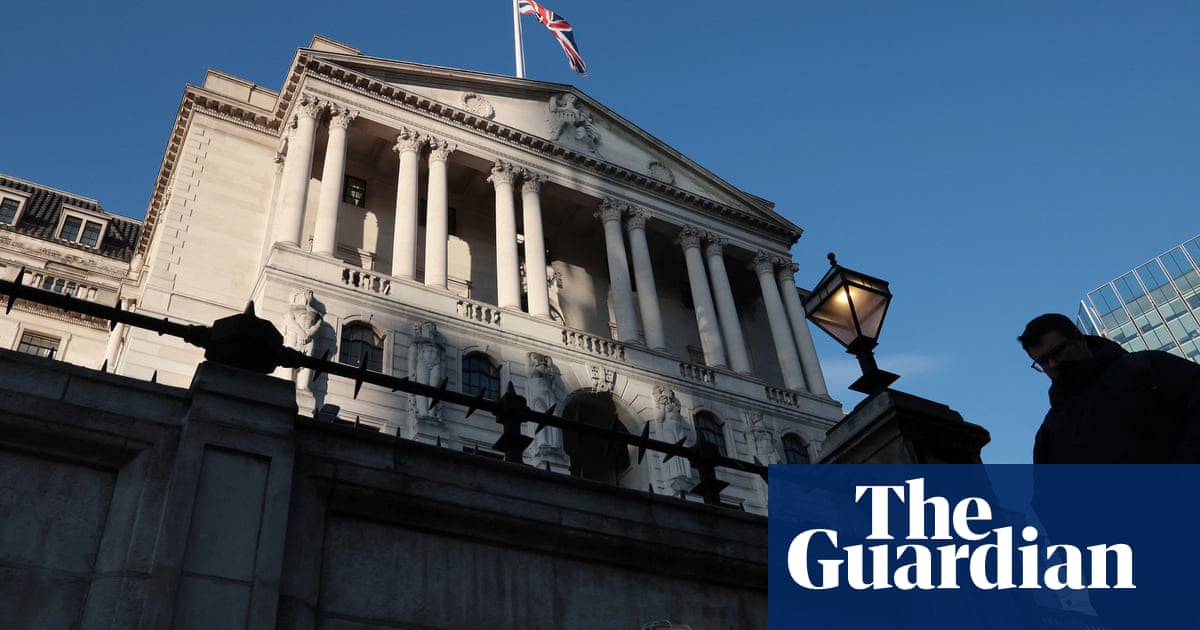Bank of England faces bumpier road after inflation accelerates

Andrew Bailey had warned there would be a bump in the road. But after inflation jumped by more than expected to 3% in January, the Bank of England governor could be in for a rockier ride than anticipated.
For the chancellor, Rachel Reeves, too, it will be a tough road to travel, having promised to achieve economic growth that can be “felt in people’s pockets” – amid the accusation Labour is leaving those pockets feeling lighter, not heavier.
A few years ago, Bailey and his peers in the US and the eurozone were burned by predicting the period of high inflation coming out of the Covid pandemic would be “transitory”, only to see living costs continue to accelerate amid a succession of economic shocks.
It is a debacle that could have worrying parallels this time around. While Threadneedle Street has warned that inflation could hit a fresh peak of 3.7% later this year, it reckoned this would prove temporary, as it kept the door open to further interest rate cuts.
Some City investors say this is wishful thinking. Despite all the warnings, including from the central bank, the economy grew in the final quarter of last year, while pay growth accelerated and unemployment remained low. Although growth remains sluggish, inflationary pressures are bubbling under the surface.
Given the Bank’s recent experience of calling things wrong, it would be an uncharacteristically bold move to cut borrowing costs while headline inflation is so far above its 2% target rate.
However, there are reasons why the latest inflationary burst might not prove persistent in nature. City traders appear to agree, with financial markets continuing to price in two further quarter-point interest rate cuts from the Bank this year.
The shocks facing the UK economy are considerably smaller than in 2022, when Russia’s invasion of Ukraine forced the Bank to shred its transitory inflation forecasts. Putin’s war came against a backdrop of global supply bottlenecks, labour shortages and red-hot consumer demand, but the economy is much weaker this time around – even if conditions are more robust than feared.
Much ink will be spilled over Labour’s introduction of VAT on private school fees driving up inflation. But this was well anticipated, and added only 0.08% to the change in the headline rate between December and January. The surprise that meant inflation overshot the City’s 2.8% forecast was from air fares rebounding from an unusually low reading in December, which contributed four times as much.
Over the coming months inflation is expected to rise further, with a colder than expected winter in Europe pushing up energy bills. Food prices are also on the climb in a renewed squeeze for households.
after newsletter promotion
There will also be turbulence for Reeves, who will receive the second round of forecasts for the economy and public finances from the Office for Budget Responsibility on Wednesday, before next month’s spring forecast.
Business leaders say her £25bn increase in employer national insurance contributions and 6.7% rise in the minimum wage – due to come into effect from April – will force them to pass on the higher costs of employment to consumers by raising their prices.
However, there is a large degree of uncertainty over how much pricing power companies will have, with households still reeling from the sharpest increase in living costs since the early 1980s. Donald Trump’s trade wars will complicate matters further: inflation in Britain could be stoked, if the pound falls, or if the government retaliates with tariffs; or prices might drop, should Chinese goods previously destined for the US flood into the UK.
While there is a danger that Britain finds the inflation bump turns into a giant pothole, that is far from certain just yet.
Related
Why investing in women is a vital next step for…
Get Nadine White's Race Report newsletter for a fresh perspective on the week's newsGet our free newsletter from The Independent's Race CorrespondentGet our fre
Business secretary signals major shift on electric car policy to…
In a determined effort to retain Nissan’s manufacturing presence in Britain, Business Secretary Jonathan Reynolds has vowed to implement “substantial c
Joint Statement: Business Secretary and Fujitsu Services Ltd
Business and Trade Secretary Jonathan Reynolds today (Friday 7 March) met chiefs for Fujitsu in Tokyo to begin talks over the cost of redress for victims of th
UK foreign secretary backs multilateral defence funding for Europe
UK foreign secretary David Lammy has said that a new multilateral fund will be needed to secure Europe’s defence as he confirmed that Britain is “open to”













